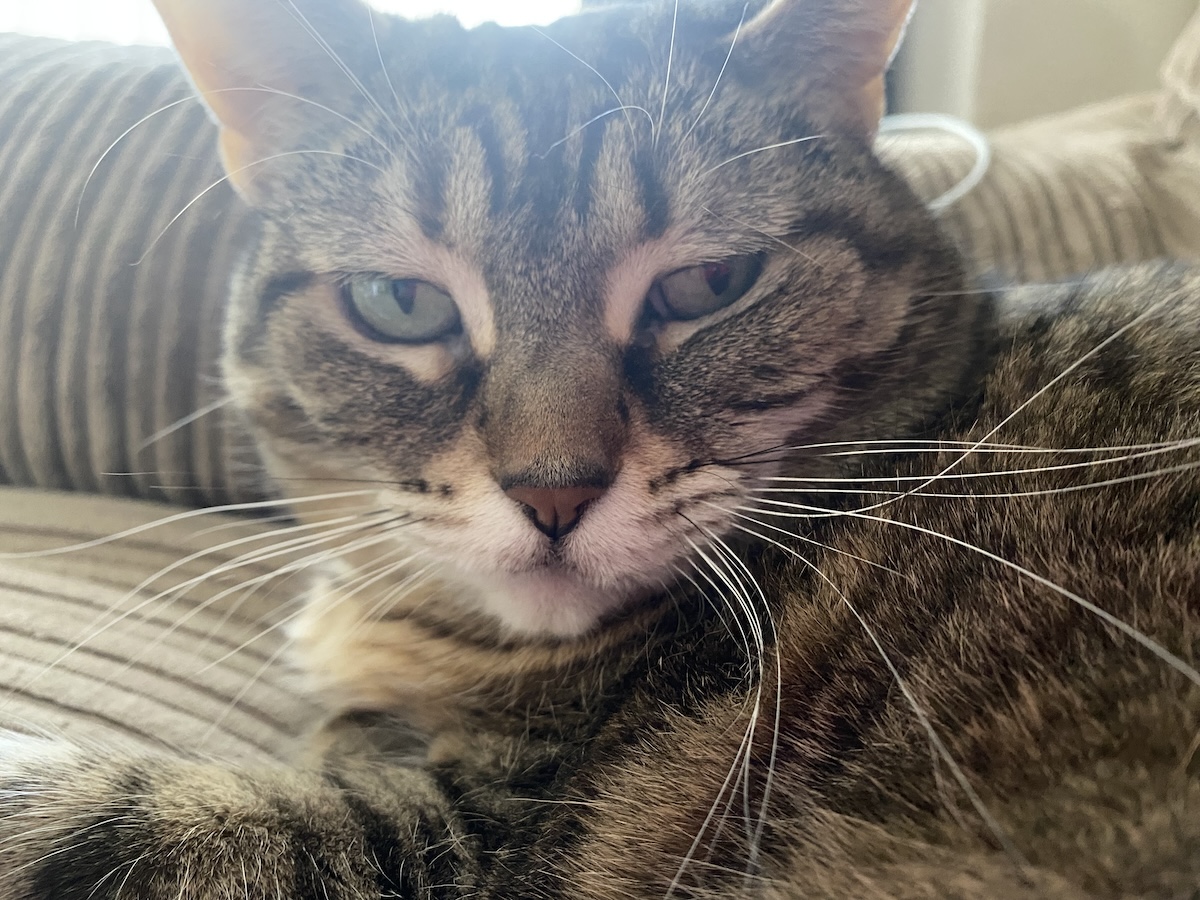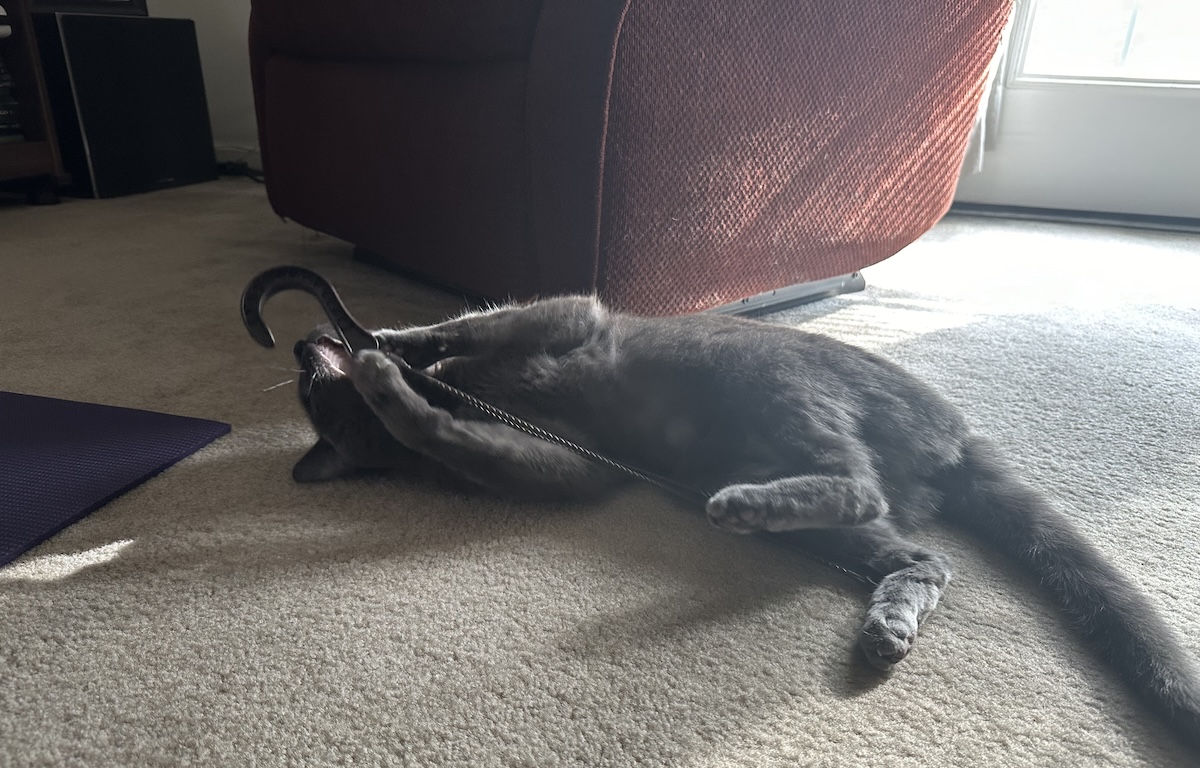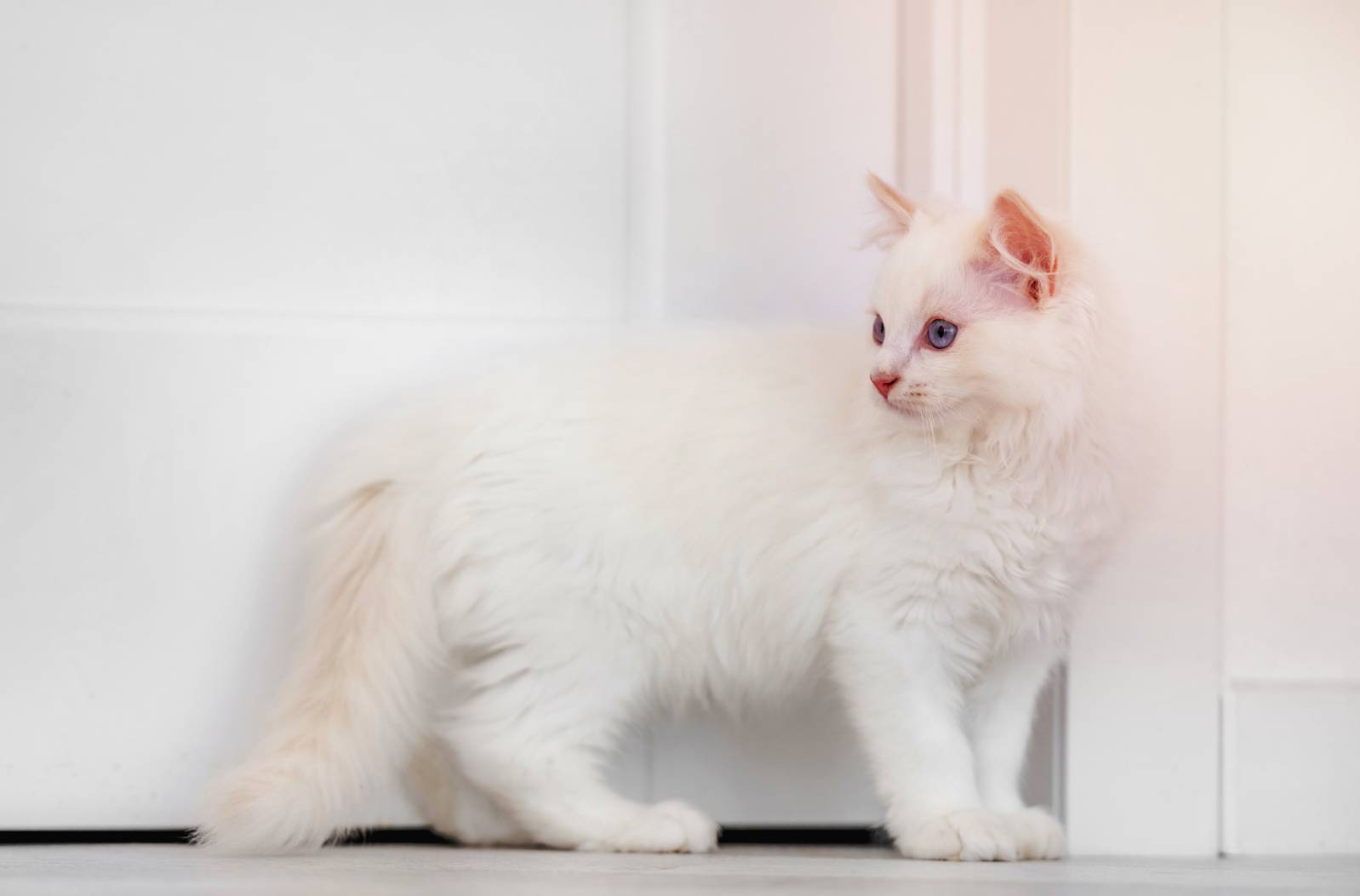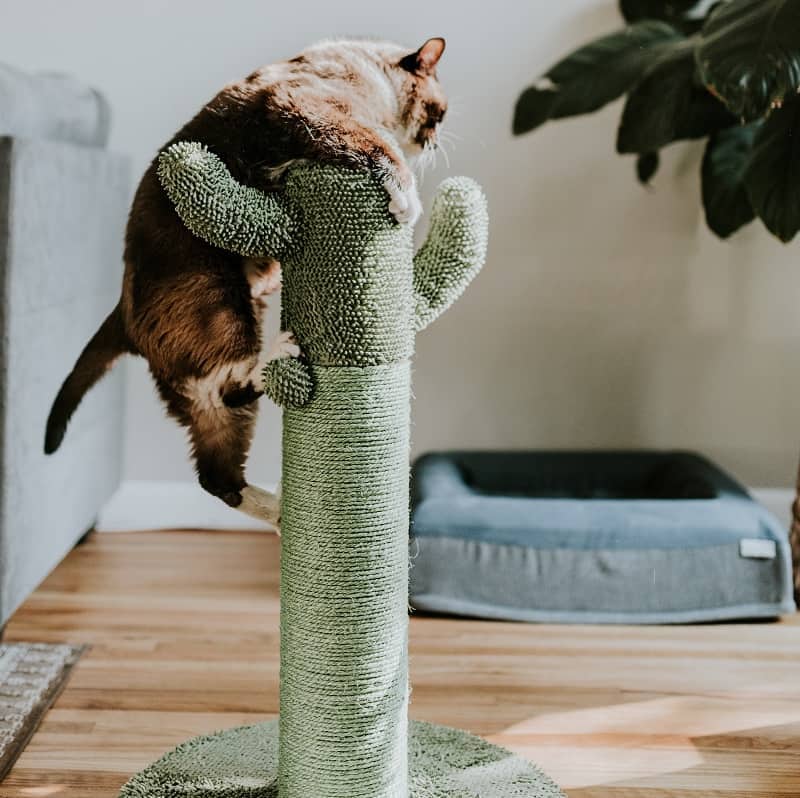
Some scratching posts are built from inexpensive and replaceable materials like cardboard, whereas others are made from hardy, longer-lasting materials like ropes and fiber. Scratching posts come in a wide variety of sizes and can be freestanding or mounted, depending on your feline’s preferences.
With this wide array of available options, it can become overwhelming to find the right one. In this article, we narrow down the options to the best six scratching posts to suit your cat’s unique needs.
A Quick Comparison of Our Favorites (2024)
| Image | Product | Details | ||
|---|---|---|---|---|
| Best Overall |
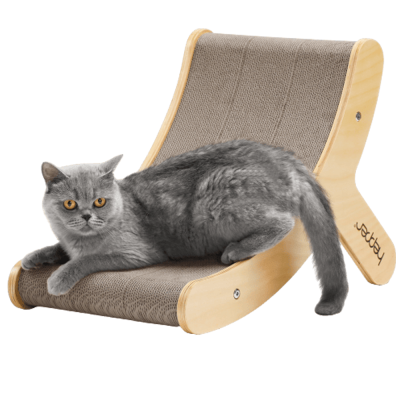
|
Hepper Hi-lo Modern Cat Scratcher |
|
CHECK PRICE |
| Best Value |
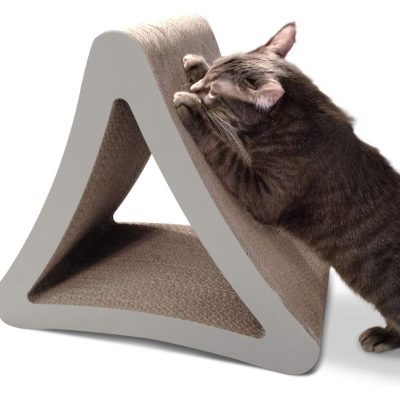
|
PetFusion Vertical Cat Scratching Post |
|
CHECK PRICE |
| Premium Choice |
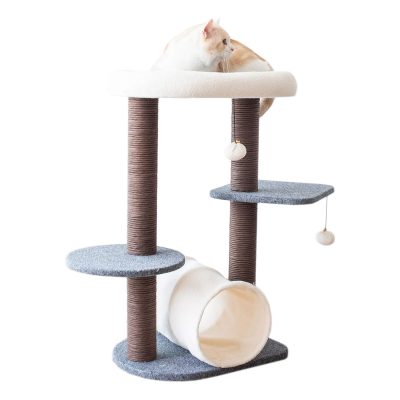
|
PetPals Cat Tree Tower Scratcher Post |
|
CHECK PRICE |
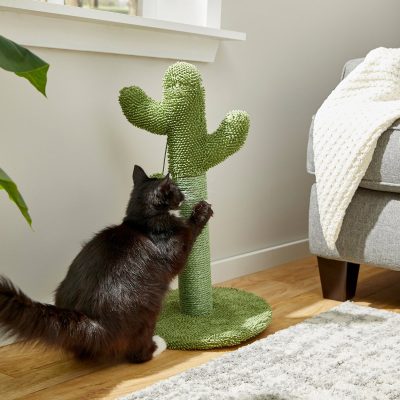
|
Frisco Cactus Cat Scratching Post |
|
CHECK PRICE | |
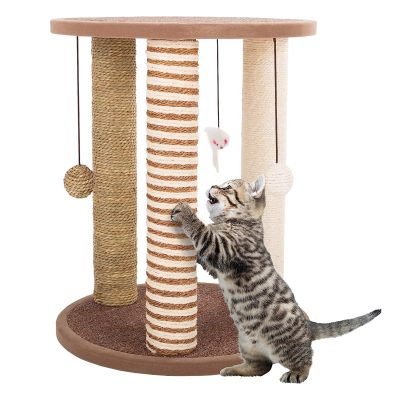
|
PETMAKER Cat Scratching Post |
|
CHECK PRICE |
The 10 Best Modern Cat Scratcher Posts
1. Hepper Hi-lo Modern Cat Scratcher
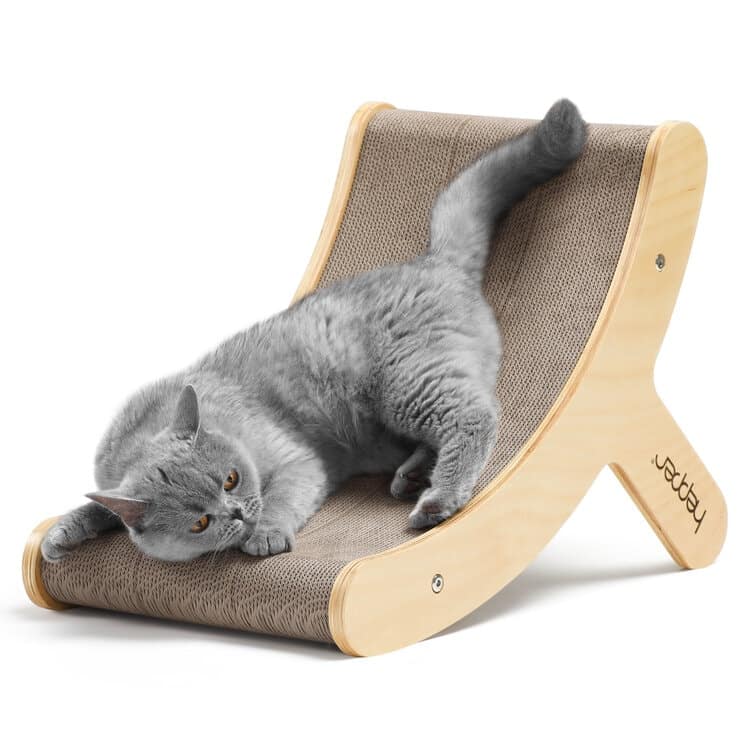
The Hepper Hi-lo Cat Scratcher can be set to five different angles, just one of the reasons that it’s our pick for the best overall modern cat scratcher. We also love the minimal, modern design that makes it blend into any home, and it has a sturdy wooden frame for stability. The scratcher is made with 3-inch-thick cardboard, and the capability of setting the scratcher at multiple angles makes the cardboard panel last far longer than a stationary alternative and gives your cat new interesting angles to try out. This scratcher is one of the best-looking and longest-lasting options out there!
This scratcher is difficult to fault, but it is a little more expensive than some of the others on the list. However, the cardboard is replaceable if it gets worn out.
At Catster, we’ve admired Hepper for many years and decided to take a controlling ownership interest, so that we could benefit from the outstanding designs of this cool cat company!
- Five different angles to try
- Minimal, modern design
- Sturdy wooden frame
- 3-inch thick cardboard scratchpad
- Long-lasting
- More expensive than other options
2. PetFusion Vertical Cat Scratching Post — Best Value
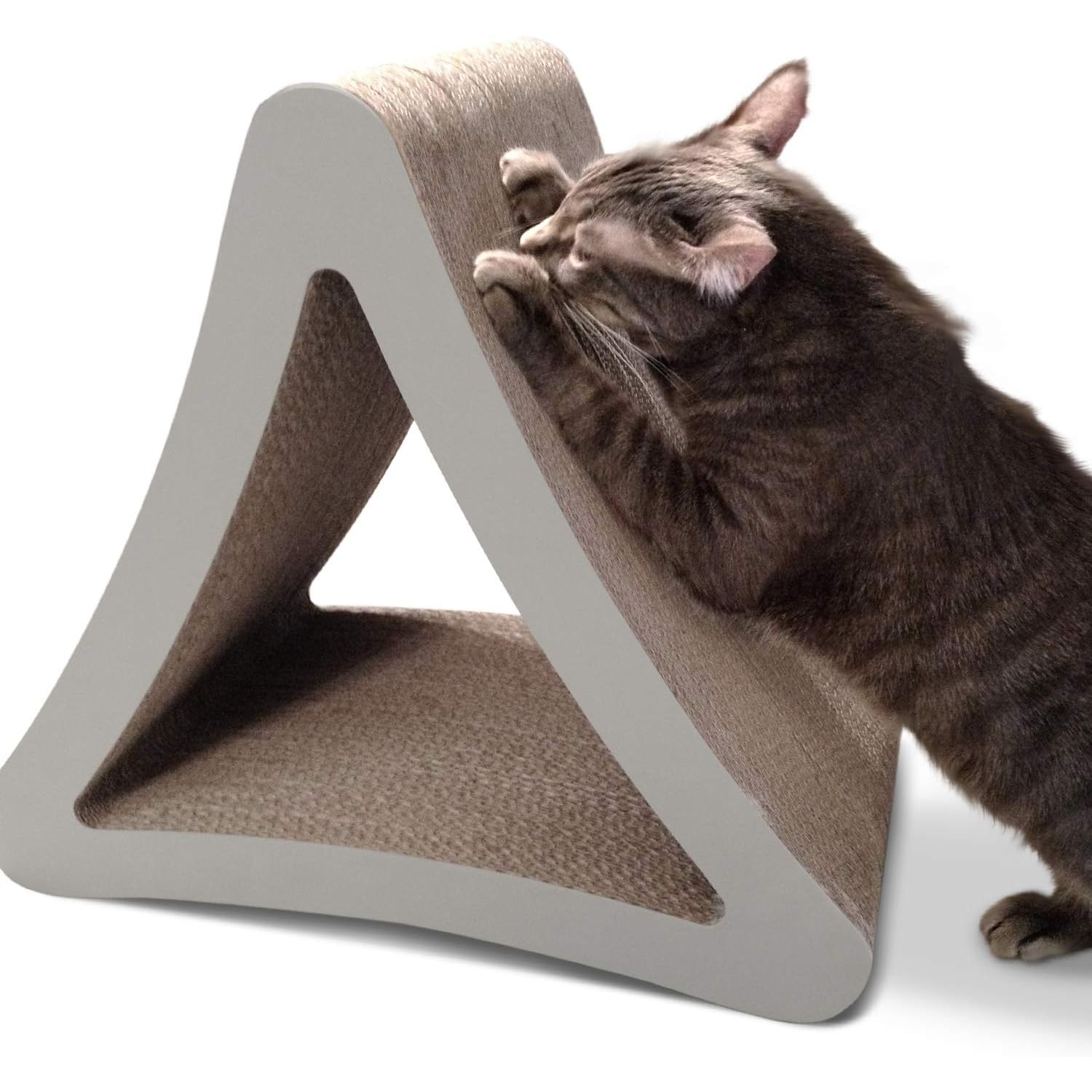
The best modern cat scratching post for the money is the Vertical Cat Scratching Post from PetFusion. This three-sided scratching post is made with recycled cardboard and non-toxic cornstarch glue, making it pet-safe and environmentally friendly. The unique, hollow, triangular design doubles as a scratching post and play area for your feline, making a great perch and small hideout. We love that the interior of the triangle is also covered with cardboard, providing multiple heights and angles for your cat to scratch to their heart’s content. This scratcher is incredibly long-lasting, with some customers reporting the product still being in use a year after purchase!
While this scratcher is long-lasting, the cardboard is, unfortunately, not replaceable. Also, the cardboard shreds easily, leaving a mess after every scratching session, keeping this scratching post from the top position on this list.
- Made with recycled cardboard
- Unique triangular design
- Multiple heights and angles for scratching
- Long-lasting
- Comparatively inexpensive
- Cardboard panels are not replaceable
- Cardboard shreds easily
3. PetPals Cat Tree Tower Scratcher Post — Premium Choice
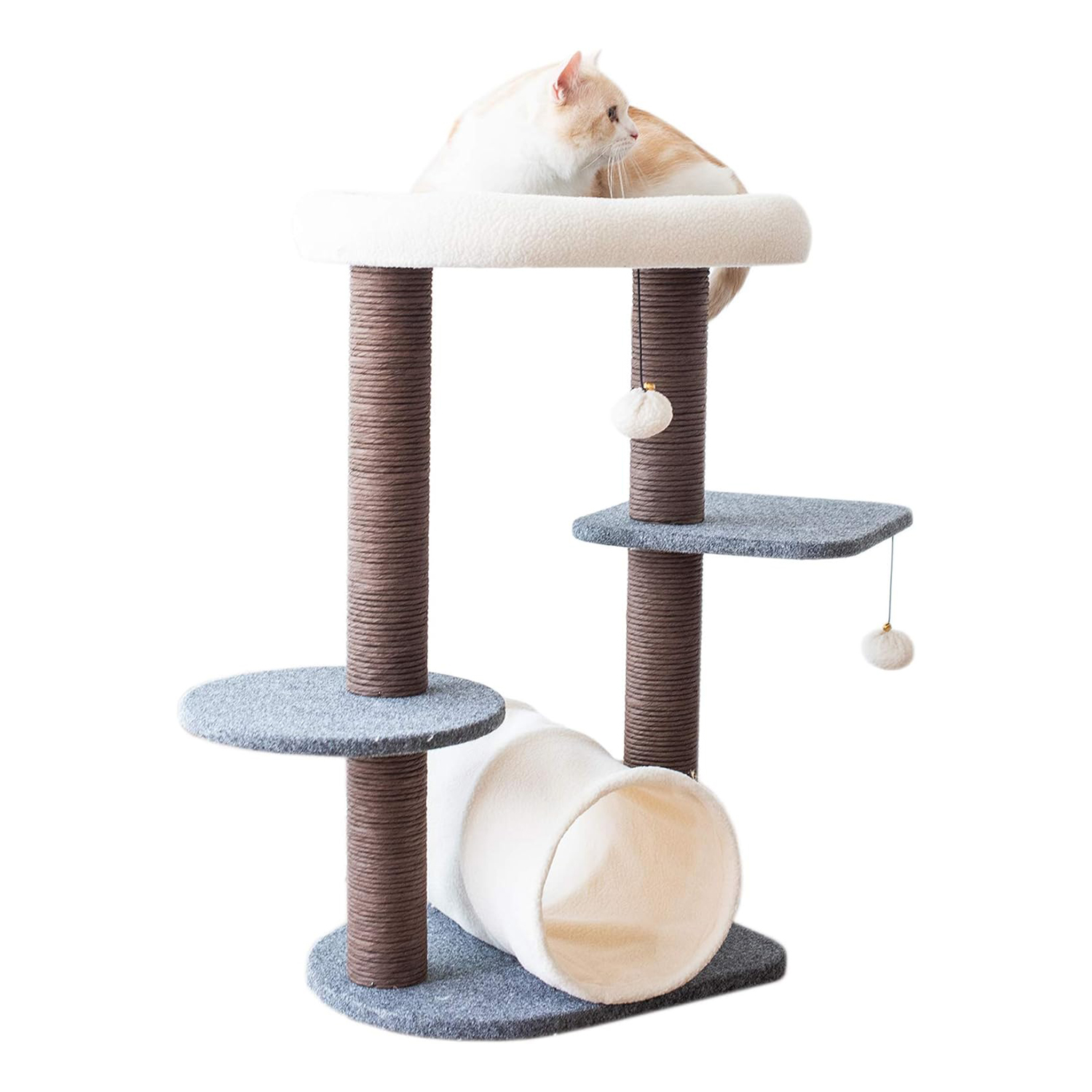
If you are looking for a premium quality scratching post and play area combination, we highly recommend the Cat Tree Tower Scratching Post from PetPals. The tower is made up of three different levels held together by a post covered with paper rope for scratching. It’s on a weighted base that prevents sliding and falling over. The top tier is made with soft felt for napping and relaxing, and the base layer has a soft tunnel to hide and play inside of. There are also toys hanging from the perches for your cat to play with, and the post is easy to clean with a vacuum or a lint roller. The perch is also a breeze to assemble, with all the tools and instructions included, and should take you no more than 10 minutes.
The only issue that we have with this scratcher is stability. Some customers report that it falls over easily with large cats, so you may need to stabilize it yourself somehow, which keeps it from the top two positions on this list.
- Scratching post and play area combination
- Three different levels
- Paper rope covered posts for scratching
- Soft tunnel on base
- Hanging toys included
- Easy to clean
- A breeze to assemble
- Expensive
- Fairly unstable with large cats
4. Frisco Cactus Modern Cat Scratching Post
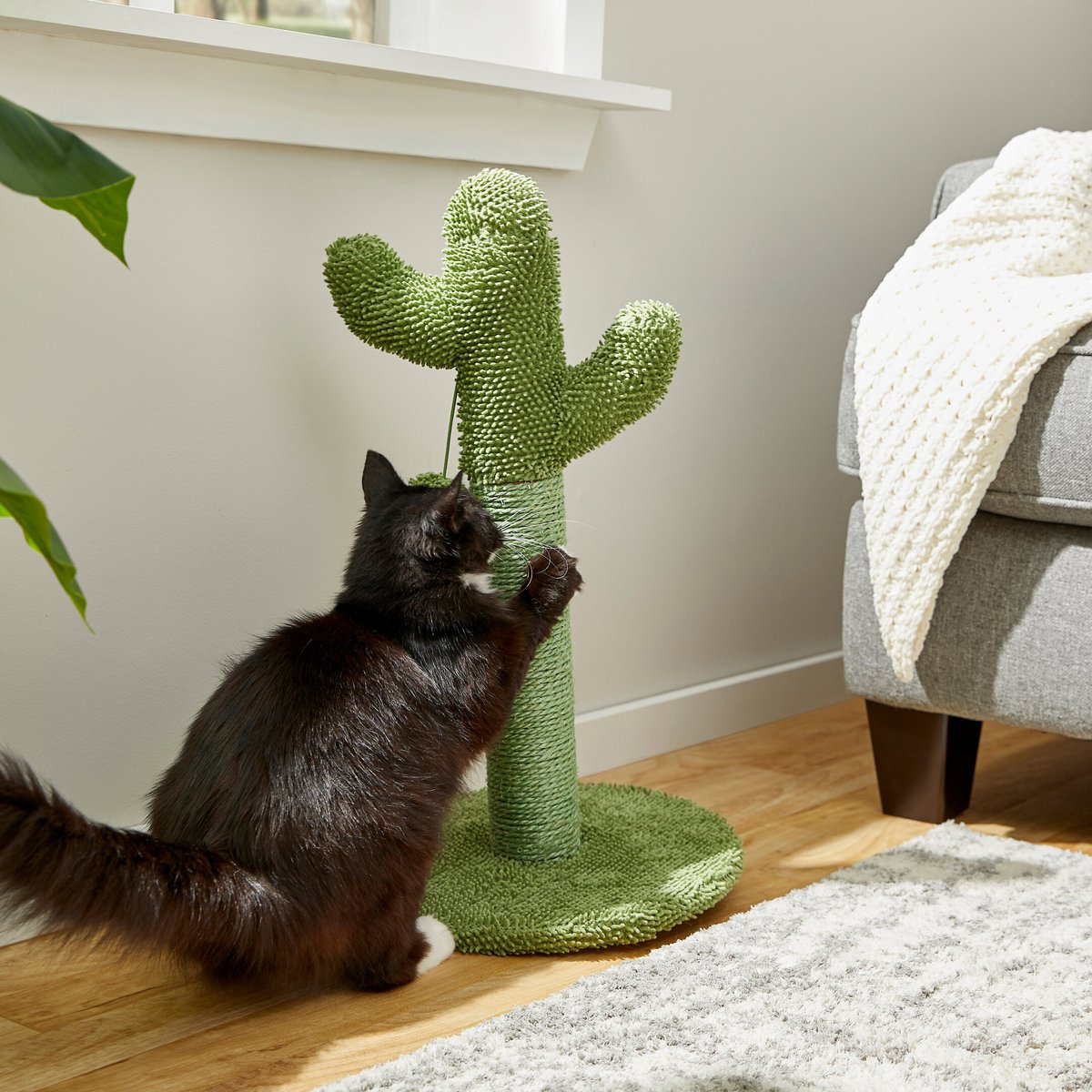
If you are looking for a truly unique cat scratching post, this Cactus Scratching Post from Frisco certainly ticks all the boxes! There is a function to the unique design, though, as the two arms of the cactus give your feline multiple angles to play and stretch. The center of the cactus is made with strong sisal rope for scratching, and the base and top are covered with plush fabric to climb, perch, and snuggle with. It has a stable two-piece base that won’t fall over easily even with loads of play, and the cactus comes with a plush toy attached to a bungee for added entertainment!
The plush top is filled with stuffing, and several customers reported that their cats ripped it open within a few hours. Also, this scratcher is fairly lightweight and can fall over with larger cats.
- Unique design
- Inexpensive
- Strong sisal rope scratching area
- Plush fabric top and base
- Plush toy with a bungee attachment included
- Stuffed cactus arms rip easily
- Fairly lightweight
5. PETMAKER Cat Scratching Post
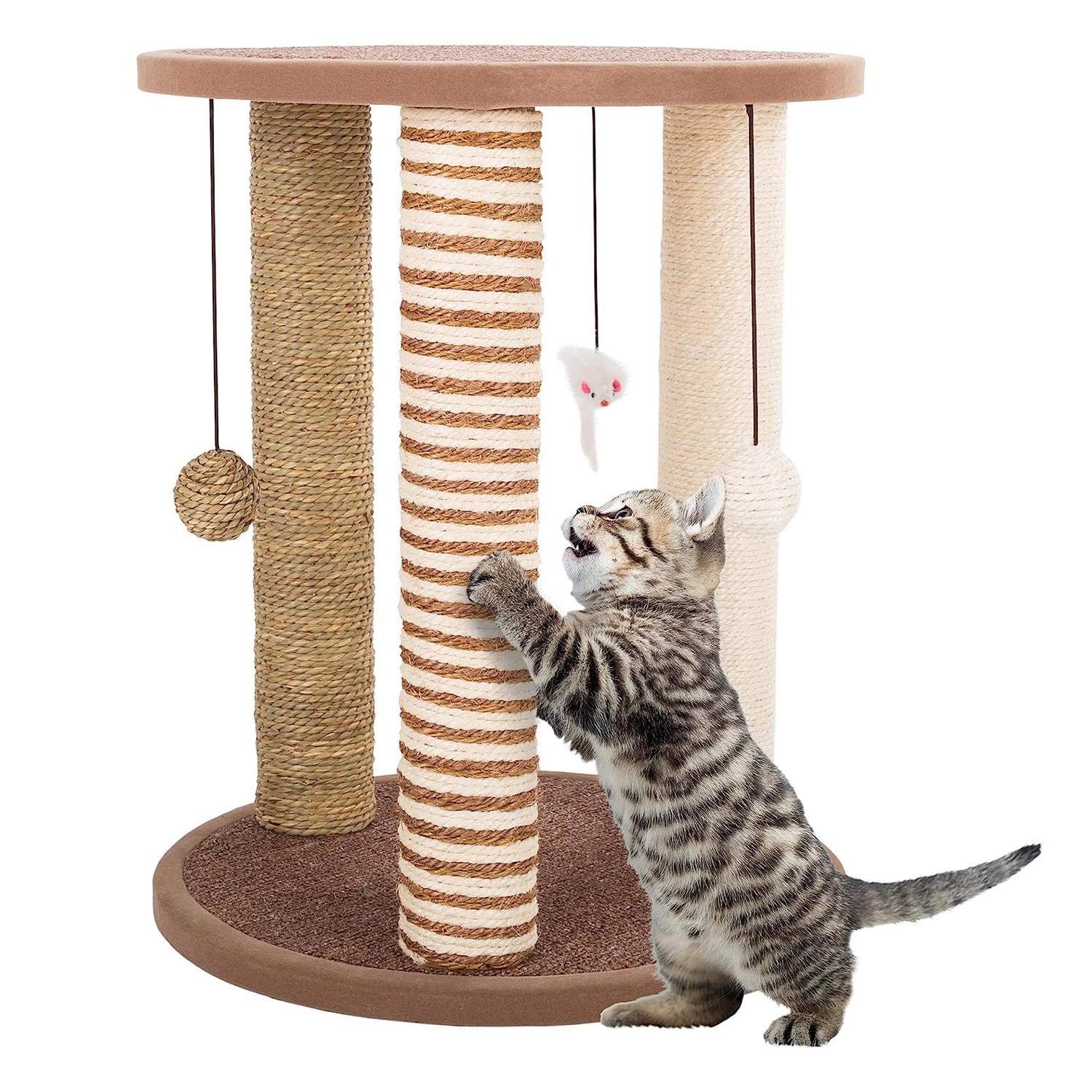
This cat scratching post from PETMAKER is a scratching post, play area, and perching post all rolled into one. It features three scratching posts, each with a different color and design, ideal for multiple cat households. Each pole is wrapped in strong sisal rope, making it a durable scratching post that will last. The perch has three balls hanging from the top for your feline to play with, a sturdy base, and a comfortable carpeted base and upper perch with a soft velvety lining for an ideal place for your cat to rest after loads of playing. This post is also relatively inexpensive considering all the features.
Several customers report that their cats easily ripped off the hanging toys, and the sisal rope came undone after just a few weeks. Also, the bolts holding the posts in place stick out the bottom of the base and may scratch your floor.
- Three different scratching posts
- Three hanging toys
- Comfy cat perch
- Sturdy construction
- Carpeted base and perch
- Inexpensive
- Toys are easily ripped off
- Sisal rope may come undone
- Exposed bolts under the base
6. Midwest Feline Nuvo Grand Forte Scratching Post
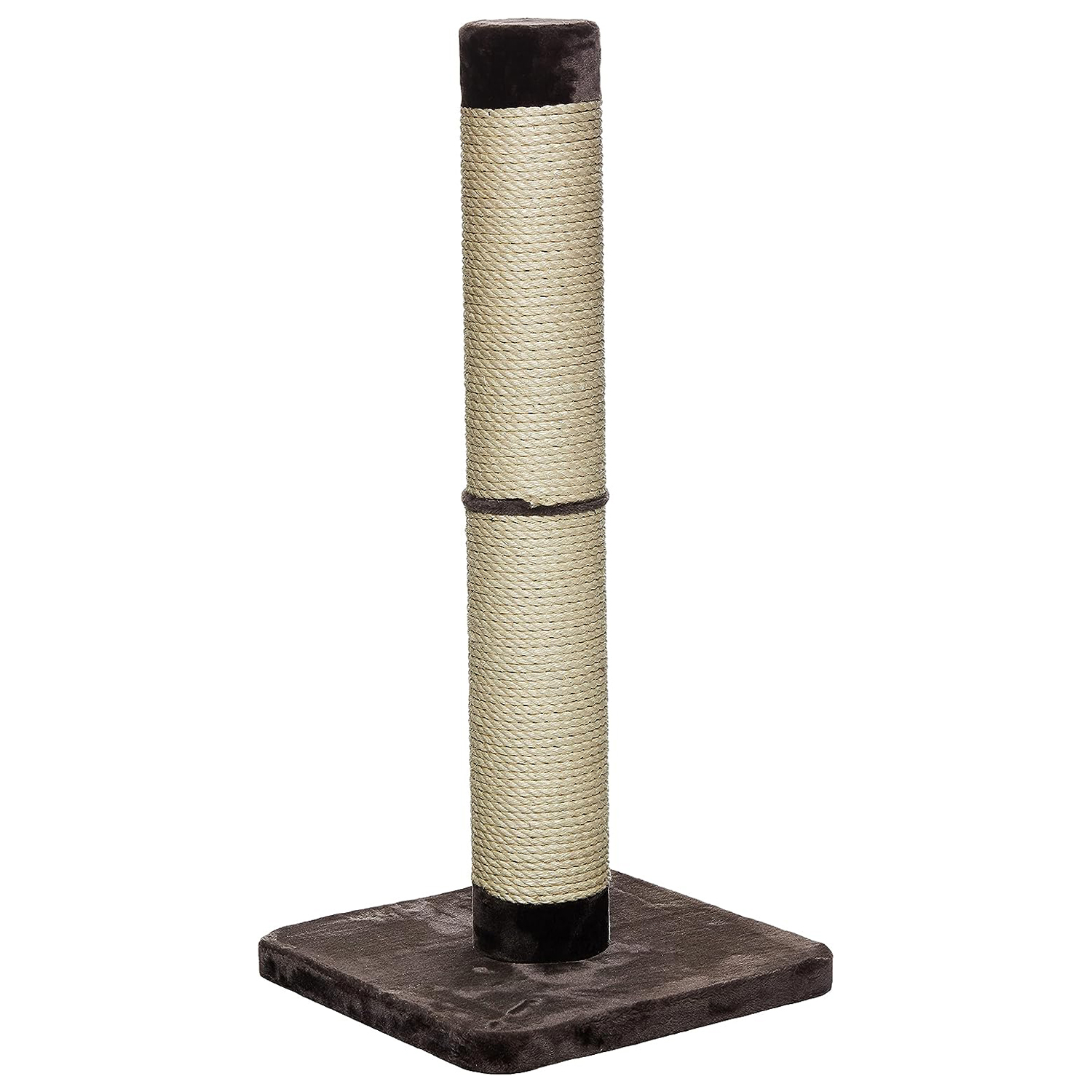
This Midwest Feline Nuvo Grand Forte Scratching Post has a pretty straightforward design, but the colors should fit in with most home decor styles thanks to its modern colors. This scratching post is 41 inches tall and is a bit oversized, so it’s a good choice if you have larger cats or more than one cat. It also has a sturdy, oversized base wrapped in brown faux fur, while the scratching surface is wrapped in sisal rope.
However, it is a little pricey considering its simple design, and it may take up too much room in smaller spaces.
- Modern colors
- Over 3 feet tall
- Great for large or multiple cats
- Pricey
- Make take up a lot of space
7. SmartCat The Ultimate Sisal Cat Scratching Post
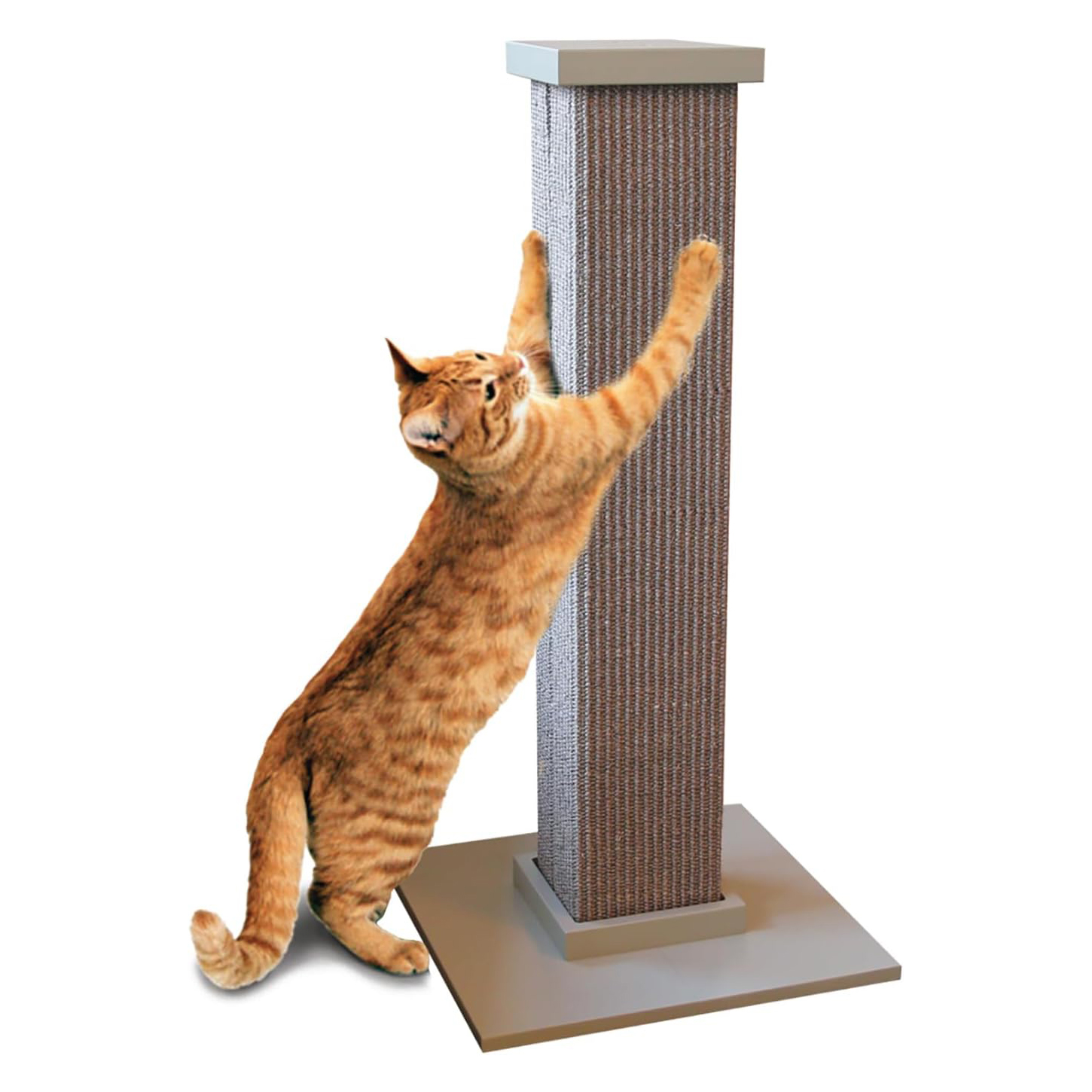
SmartCat The Ultimate Sisal Cat Scratching Post is another pretty simple scratching post that comes in two color options: beige and gray. The 16 x 16-inch square base is made of sturdy engineered wood, and the wooden look fits in well with modern design. The post is wrapped in sisal fabric, and the scratching surface itself is 32 inches tall. It’s also easy to assemble, using only two screws.
This scratching post is also a little pricey, and since it doesn’t have a carpeted base and only a vertical scratching surface, it may not work for cats that prefer to scratch horizontally.
- Two color options
- Easy assembly
- Sturdy wooden base
- Pricey
- Some cats prefer to scratch horizontally
8. Feandrea Cat Scratching Post
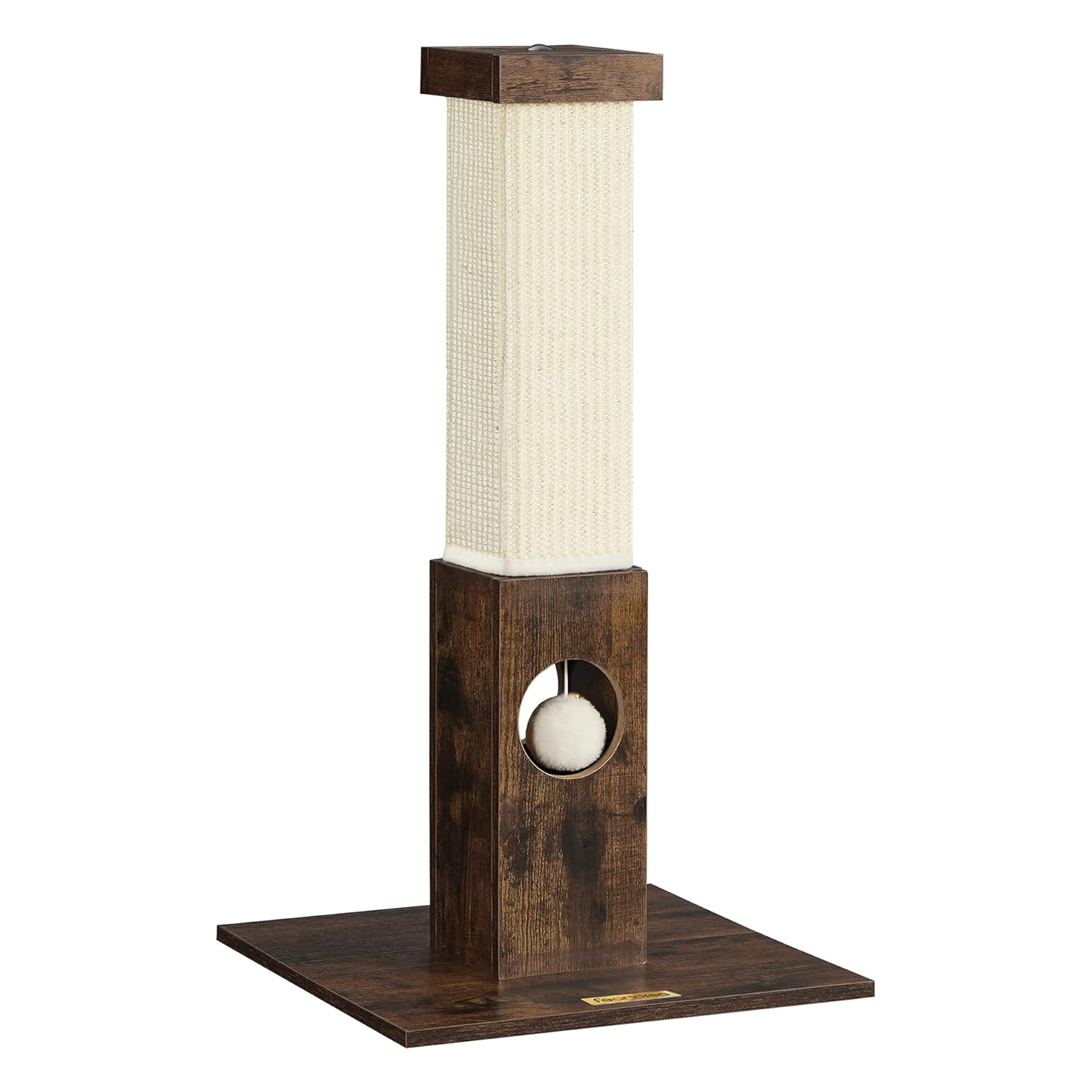
The Feandrea Cat Scratching Post certainly has a unique design, and we think it fits in with a modern theme quite nicely. Only half of the post is covered in sisal rope, and below the scratching surface is a ball that your cat can bat at. It also has a sturdy wooden base with a dark wood stain (there’s also a lighter wood stain option), and the scratching post is affordable and only 28.7 inches tall, so it won’t take up as much space.
However, since the scratching surface is smaller, kittens still may not be able to reach it until they get a little older. And as with our previous option, this one may not be a good choice for cats that like to scratch horizontally.
- Two color options
- Also has a ball for your cat to bat at
- Doesn’t take up a lot of space
- Smaller scratching surface
- For vertical scratching only
9. Way Basics House Cube Scratcher
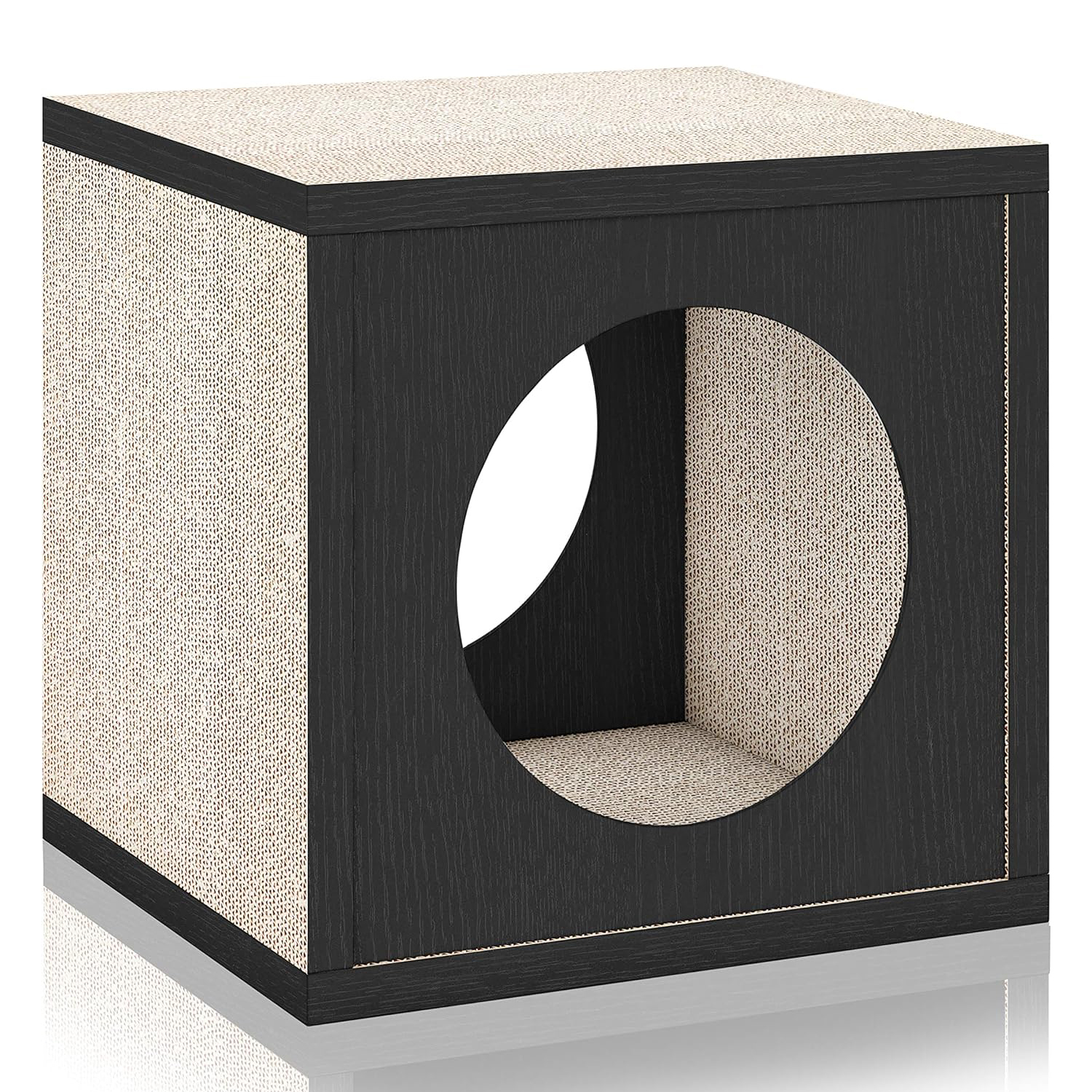
The Way Basics House Cube Scratcher is certainly an interesting take on a scratching post. The top and sides of this house provide a scratching surface for your cat, as do the inside surfaces. It’s great for cats that prefer to scratch horizontally or vertically, and your cat can also hang out inside even if they aren’t scratching it. It also comes in three different colors.
However, the scratching surfaces are made of cardboard, so they may not be as durable as those made from sisal. Also, while this scratcher is great for small cats and kittens, it may not work as well for large cats.
- Unique design
- Scratching surfaces inside and out
- Comes in three colors
- May not be as durable
- May be harder for large cats to use
10. 7 Ruby Road Wall Mounted Cat Scratching Post
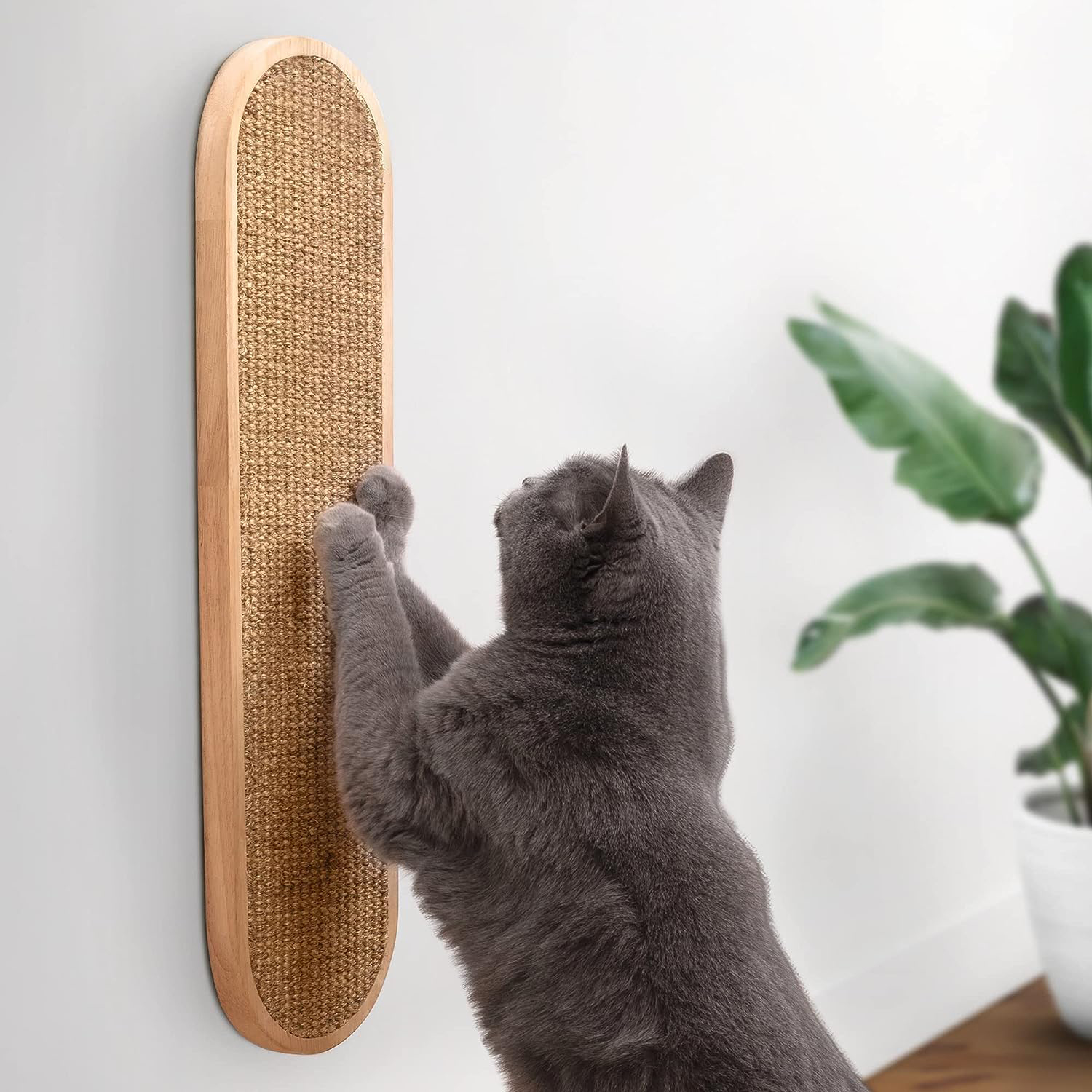
This wall mounted cat scratching post by 7 Ruby Road is definitely a modern option, and it doesn’t take up much space at all. It is 29.5 inches tall and has a wide scratching surface. Because you can mount it as high or low on the wall as you want, it’s great for cats of all sizes. It’s made of wood and sisal rope, and the scratching surface is replaceable if your cat wears it down.
However, it is a little on the pricey side, and since it mounts to the wall using screws, you may not be able to use this scratcher if you live in a rental home or apartment in which you can’t hang things on the walls.
- Wide scratching surface
- Doesn’t take up much space
- Can hang it as high or low as you want
- Pricey
- Not suitable for all homes
Buyer’s Guide: Choose the Best Modern Cat Scratching Post
Cats need scratching posts for a variety of reasons, and the practice is inherently instinctual for them. In order to save your furniture from becoming your cat’s favorite scratching post, it’s an essential item to have around the home. In fact, we recommend having at least two, especially if you have multiple cats. This way, you can put them in different locations around your home and make them easily accessible to your cat. This will also allow you to try different types and see which ones your cat prefers.
With this in mind, there are a few different factors to consider when buying a cat scratching post.
Size
Cat scratching posts come in a wide variety of sizes and generally, the taller, the better. Some cats prefer vertical scratching posts, while others prefer more horizontal varieties. You may need to test a couple out to see which your cat prefers. Some posts have an adjustable frame so they can be used either way, and this may be the best bet in the beginning.
A good gauge is to check what your cat is scratching at the moment. For example, if they are scratching the legs of your furniture, a vertical post will probably suit them best. Whatever style you choose, the longer or taller it is, the better, as it will allow your feline to stretch out and fully extend their legs. Around 30 inches tall is a good rule of thumb for most cats.
Materials
Cat scratching posts are typically made from either cardboard or sisal rope. Some are made with carpeting, although this will get your cat accustomed to the idea of scratching carpets, and you can kiss your rugs goodbye!
Cardboard
Cardboard is the most inexpensive material used, specifically corrugated cardboard, and cats love it! It makes a satisfying noise, has a soft texture, and shreds easily, making it irresistible to most felines. Most cardboard scratching posts will not last long, though, depending on the quality and how many cats are using it. They’ll typically last anywhere from a few months up to a year — or even less if multiple cats are clawing at it!
While they are typically inexpensive, cardboard scratching posts make a mess. Good-quality cardboard scratchers are not as bad, but cheap varieties can leave a substantial amount of cardboard flakes after a scratching session. That said, even expensive versions will eventually wear out too.
- You might also like: 8 Ways to Get Your Cat to Use a Scratching Post
Sisal
Sisal is a tough plant fiber commonly used to make rope and fabric for cat scratching posts. It is usually glued or tightly bound around a post of varying thicknesses. Sisal rope or fabric is great because it is tough and holds up well for far longer than cardboard. Cats love the tough texture, and even in multiple cat households, a sisal cat scratcher can last for 2 or 3 years. Of course, these are more expensive than cardboard scratchers.
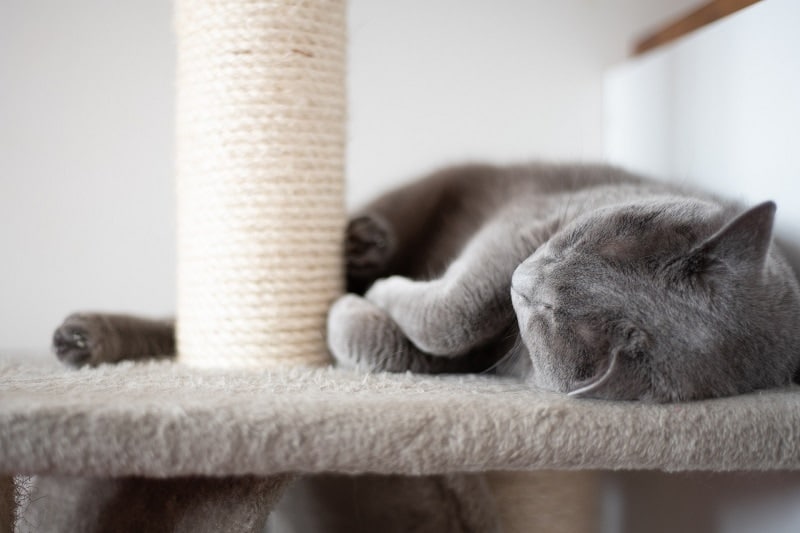
Stability
This mostly applies to scratching posts, but other varieties need stability too. If your scratching post is unstable or wobbles in any way while your cat is using it, they will probably be cautious of it and unlikely to try it again. Scratching posts need to have a heavy stable base that can hold the full weight of your outstretched cat without falling over. This is why cats love using trees and furniture as scratching posts — they are super stable.
Accessories
There are many scratching posts out there that are just that: a post for your cat to sharpen their claws. Others, however, combine sisal fabric and rope into perches, hideouts, and veritable cat condos that have all the accessories that your cat could wish for. These can be as simple as a post with a perch on top or as complex as multiple posts with varying heights of perches, hideouts, and hanging toys that will keep your cat entertained for hours. Naturally, the more accessories that the perch has, the higher the cost, but it’s definitely a worthwhile investment, especially if you own more than one cat.
Benefits of Cat Scratching Posts
Besides saving your furniture from being shredded, there are key benefits to providing your cat with a scratching post, including:
- Nail maintenance. Cats have long, sharp nails designed to grab prey. These nails need to be kept trim, and a scratching post will help do just that. Regular scratching will keep your cat’s nails short, sharp, and healthy and help stretch out their legs and toes.
- Tall scratching posts are ideal for cats to stretch with. Cats stretch not only because it feels good and it’s good for their health, but stretching also increases blood flow throughout their bodies after resting and sleeping. Scratching posts with added toys and perches also provide great mental and physical stimulation for your cat.
- Scratching is a part of your cat’s natural instincts, and if they are not given a scratching post, they’ll turn their attention elsewhere. It also helps relieve boredom in cats by keeping them physically active and stimulated and is a great way for kittens to burn off excess energy.
Where Should You Put the Scratching Post?
We highly recommend having more than one cat scratcher post in your home, particularly if you have more than one cat. This will hopefully prevent your cat from getting bored and turning its claws back onto the furniture!
You should place the scratching post close to or in front of any furniture that they may have been scratching. You can then move it somewhere else once they’ve become accustomed to it. You can place catnip and toys on the scratcher to encourage them to use it, and then place it where they are often hanging out. For homes with multiple cats, a cat scratcher can be a great meeting point for your cats to socialize and catch up on gossip!
Conclusion: Best Modern Cat Scratching Post
Our top pick for best overall cat scratching post is the Hepper Hi-lo Cat Scratcher. This cat scratcher has a modern design and is sturdy to prevent slipping. The strong construction means it will last far longer than other scratchers, making it our favorite overall.
The best modern cat scratching post for the money is the Vertical Cat Scratching Post from PetFusion. The three-sided triangular scratching post is made with recycled cardboard and non-toxic cornstarch glue, doubles as a play area, and is surprisingly long-lasting, giving you great value.
There are a ton of cat scratching posts on the market today, and it can quickly become overwhelming to find the right one. Hopefully, our in-depth reviews have helped you choose the best cat scratching post to suit your needs.
See Also:
Contents
- A Quick Comparison of Our Favorites (2024)
- The 10 Best Modern Cat Scratcher Posts
- 1. Hepper Hi-lo Modern Cat Scratcher
- 2. PetFusion Vertical Cat Scratching Post — Best Value
- 3. PetPals Cat Tree Tower Scratcher Post — Premium Choice
- 4. Frisco Cactus Modern Cat Scratching Post
- 5. PETMAKER Cat Scratching Post
- 6. Midwest Feline Nuvo Grand Forte Scratching Post
- 7. SmartCat The Ultimate Sisal Cat Scratching Post
- 8. Feandrea Cat Scratching Post
- 9. Way Basics House Cube Scratcher
- 10. 7 Ruby Road Wall Mounted Cat Scratching Post
- Buyer’s Guide: Choose the Best Modern Cat Scratching Post
- Size
- Materials
- Cardboard
- Sisal
- Stability
- Accessories
- Benefits of Cat Scratching Posts
- Where Should You Put the Scratching Post?
- Conclusion: Best Modern Cat Scratching Post












